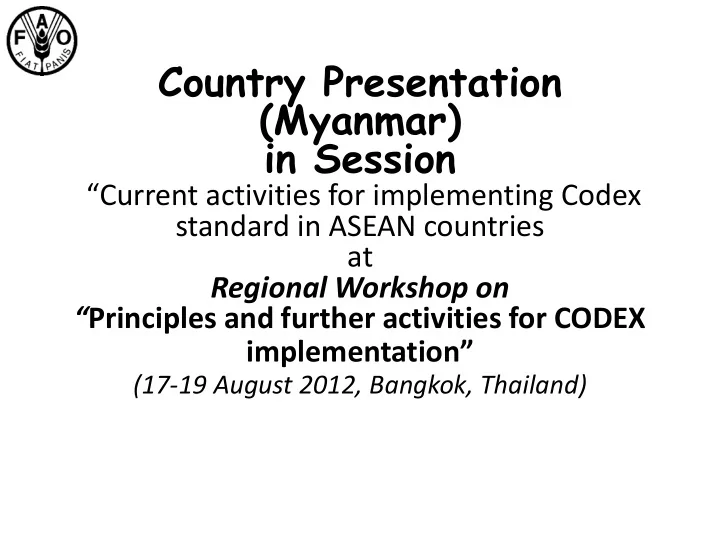

Country Presentation (Myanmar) in Session “Current activities for implementing Codex standard in ASEAN countries at Regional Workshop on “ Principles and further activities for CODEX implementation” (17-19 August 2012, Bangkok, Thailand)
Presented by Dr. Khin Saw Hla Dr. Ohnmar Soe Win
Structure of National Food Control System
Food Chain Licensing/ Import/ Services/ Production Processing Registration Export Market places Health Agriculture Health Health Industry (1) Industry (1) Livestock & CDC /DDA Trade Cooperative CDC / DDA Fisheries Customs Cooperative Trade 4
Food Safety (continue:) Principal stages of the food supply chain Supply of Agricultural Inputs e.g.. fertilizers, pesticides, animal feeding-stuffs, veterinary drugs. Primary Production e.g.. farmers, fisherman, fish farmer. Primary Food Processing e.g.. on-farm, dairies, abattoirs, grain mills Secondary Food Processing e.g.. canning, freezing, drying, brewing. Food Distribution e.g.. national/international, import/export 5
food safety(continue:) Principal stages of the food supply chain Food Distribution e.g.. national/international, import/export Food Catering Food Retailing e.g.. restaurants, street-foods, e.g.. supermarkets, shops. hospitals, schools Domestic Food Preparation 6
Food Chain (From Farm to Table) and Control Activities Site Commodities Control Authority 1. Primary production Raw produces, - Agriculture (a) Field & farm - Agricultural products - Livestock & Fisheries (b) Fishery - Livestock & Fishery products Semi finished products – sugar, 2. Primary Food - Industry (1) processing rice, flour, oil, - on diaries, abattoirs, grain mills Ready to eat food – canning, 3. Secondary Food - Health processing brewing, juice, jelly, snacks etc. - CDC , Industry (1) - Development Affairs - Co-operative 4. Food Importation Raw for processing - Health Ready to eat food - Trade - Customs 5. Retail handlers Prepared food - Health - CDC - Development Affairs 6. Home Prepared food - Health - Self-Health Knowledge 7
• Food and Drug Control activities were started since 1928. Food control work is a multisectoral, departmental and services involvement. • As food and drug safety is concerned with a number of sectors including agriculture, fisheries, industry, trade & environment, in recognition of the need for integration, Food & Drug Board of Authority (MFDBA) was formed in accordance with the provision of National Drug Law (1992). 8
• To ensure efficient and uniform control throughout Myanmar, various levels of Food and Drug Supervisory Committee (FDSC) has been formed in 1992 and reformed in 2002 • In 1995,Food and Drug Administration (FDA) has been formed under the Department of Health. • Branch of FDA in Mandalay - since 2000 • Food Advisory Committee, Food Orders and Directives Sub- committee and Food Technical Affairs Sub-committee have been formed since 2002. • Drafted 6 no. of guidelines and under process • Border station in Muse and Myawaddy opened very recently 9
Level of Codex implementation: Practices and standards are in line with codex guidelines and standards Myanmar adopted codex guidelines and standards as national reference in 2005 Government and industry are widely applied for ensuring food safety and quality nowadays.
Process of standard setting activities Adopted codex standard as national reference standard Formation of Standard Committee is under process Voluntary standard is processed in collaboration with UMFCI Participated in ASEAN Food Standards development
System for data collection and analysis The data required for standard setting comes mainly from analytical results of different food commodities from different regions
Prioritized needs of capacity building for effective implementation of Codex Standards Human resources development Trainings on food inspection based on risk assessment Trainings on chemical analysis of contaminants, food fortification Survey on Contaminants in food (microbiological and chemical) Upgrading of laboratory facility Extension of laboratories Support for laboratory accreditation Participation in International and Regional food standards works
14
Recommend
More recommend